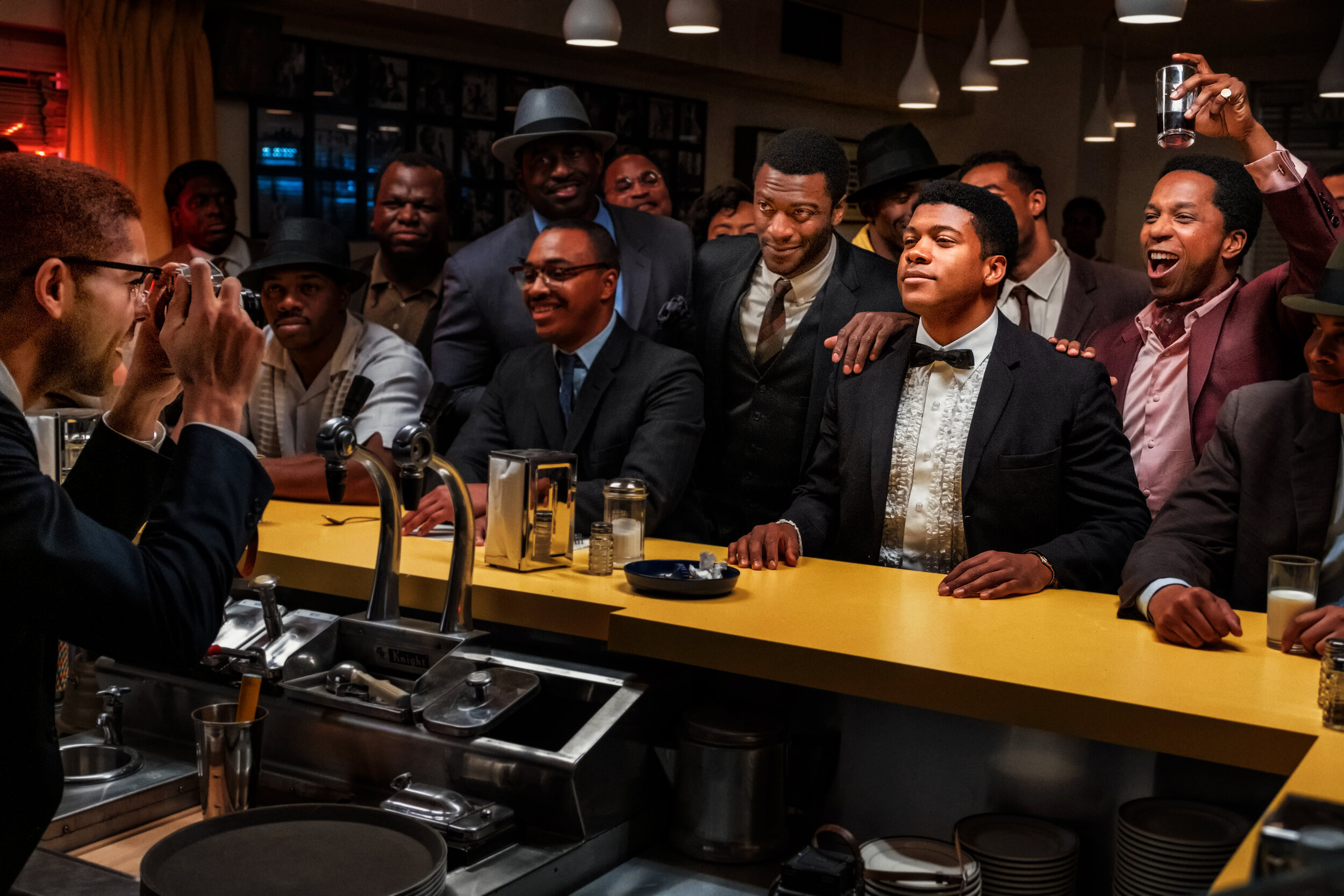You'll hold on to every minute of 'One Night in Miami'
Directed by: Regina King
Written by: Kemp Powers
Starring: Kingsley Ben-Adir, Eli Goree, Aldis Hodge, and Leslie Odom Jr.
On Feb. 25, 1964, Cassius Clay (Eli Goree) defeated Sonny Liston, a landmark event for boxing and the young, charismatic champion.
Mr. Clay raised his record to 20 wins and 0 losses. He also memorably raised shouts of “I am the greatest!” in concert with his victory. Ah, could you imagine sitting in attendance at the Miami Beach Convention Hall that day?
Well, Regina King (“If Beale Street Could Talk” (2018), “Watchman” (2019)) steps behind the camera to bring the fight to life on the big and small screens in her feature film “One Night in Miami”. Although Cassius’ win is a key moment in her movie, the events shortly after the match are the setting for this story. Cassius and three other icons - Malcolm X (Kingsley Ben-Adir), Jim Brown (Aldis Hodge), and Sam Cooke (Leslie Odom Jr.) - get together at the Hampton House Hotel for an evening of conversation. On a first pass, this premise sounds like a too-good-to-be-true pitch that belongs as a live-action “What If…?” (2021) episode at Marvel Studios.
Believe it or not, these four friends truly did meet that night in Miami. Obviously, television networks didn’t broadcast that discreet evening after the fight, so writer Kemp Powers (“Soul” (2020)) – a journalist turned screenwriter – researched the history leading up to Feb. 25, an explosive time in the United States, to pen intricate, layered discourse in King’s mesmerizing film that leaves you hanging on every word.
The movie feels like a play, which makes perfect sense because it’s based on Powers’ 2013 theatre production of the same name. Much of the film transpires in a modest room, but grand viewpoints burst through the walls as the men recognize the moment in America and their positions in it. It’s a fictionalized account, but given the nature of the Civil Rights and Black Power movements – along with the gentlemen’s career trajectories - the exchanges feel like wholly accurate, dictated accounts.
The four fellows are comrades and supporters of one another, but just like any group of friends (or family), disagreements will naturally evolve – slowly or suddenly – given the existing elements of close quarters and time. How did your last living room card game or family get-together go, right? Not every minute travels swimmingly, and this particular four-way tête-à-tête is no different.
Malcolm is the primary catalyst and pulls on threads that stretch social, financial, and religious fabric, but the others indeed hold strong stances, including Cassius. Although his tender age of 22 leaves him open to more forming at this point. Still, one could argue that he’s mastered performing down pat. Instead, Malcolm and Sam carry much of the tension, as altruism for black causes versus monetary endeavors dominate their disagreements. Like most charged disputes, however, there is not one singular path of righteousness here, and this particular nuance rises as the most engaging, at least to this critic. Meanwhile, Jim is a reserved - but highly-principled - voice of reason and the silent glue that binds all four together.
They aren’t all from the music-world, such as The Rat Pack, or the sporting-world, like LeBron James upholding friendships across the NBA. The guys reached superstardom across vast disciplines of social justice, sports, and music, which brings a special charge and anticipation of the film’s path, minute by minute, scene by scene.
How did they meet, right?
I mean, Peter Boyle – you know, the guy who played Frankenstein’s monster in “Young Frankenstein” (1974) – was John Lennon’s best man. Yes, that John Lennon, so how did that happen? That thought undoubtedly triggers a mental double-take, and I would have loved to be a fly on that wall during that 1969 wedding.
Here, King, Powers, Ben-Adir, Goree, Hodge, and Odom Jr. open a door and offer us a chair to sit down and listen to four marvels during pivotal times in their lives. In addition to each man’s towering strength, the cast and crew also offer insight into their vulnerabilities. The actors especially tap into them through their individual introductions, but also during their assembly at the hotel.
During a January Zoom group interview with the Phoenix Film Festival and other outlets, Ben-Adir said, “(I tried) my best to understand what was going on in Malcolm’s life and finding all and any information I could to give me the courage to really tap into his vulnerability. I understood quite early on - just from the brilliance of the writing - that the (vulnerabilities) of all of these men were really going to create the story arc. Without that, we would’ve been wasting our time.”
Speaking of time, King, casting director Kimberly Hardin, and the movie’s producers must have devoted countless weeks (or more) to find the right actors. Leslie Odom Jr. is demonstrably a household name, but only recently. Hodge has hit his stride too with plum roles in “Clemency” (2019), “The Invisible Man” (2020), and as the title character in “Brian Banks” (2018). Ben-Adir and Goree are new, at least to this critic. Not only do the guys resemble their famous on-screen counterparts, but they also effectively dive into their personas, but admittedly, my Sam Cooke knowledge is thin.
Still, King didn’t rush out and recruit Denzel Washington and Will Smith to portray Malcolm X and Cassius Clay/Muhammad Ali again. Due to her chosen actors’ relative – but not total – anonymity, there’s no real pondering over the thespians vs. the on-screen idols. Through Ben-Adir’s, Odom Jr.’s, Hodge’s, and Goree’s dedication, they become Malcolm, Sam, Jim, and Cassius, with zero work needed from the audience. What a gift, and so is this movie.
(3.5/4 stars)











